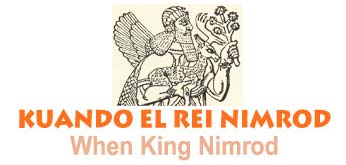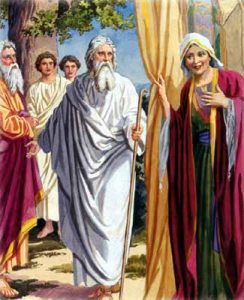
One of the best ways to understand a people is through their folk songs, which reflect both their mundane reality and their overriding world-view. The notice of Abraham’s birth in the book of Genesis is very brief: “When Terah had lived seventy years, he begot Abram, Nahor, and Haran” (Genesis 11:26). The Israelite folk imagination, however, could not leave the moment unelaborated, and a many midrashim, legends and traditions grew up around this pivotal event in the history of the Jewish people.
Many of these midrashim tell of the evil King Nimrod, a famed hunter and astrologer, who not only foretold the birth of Abraham but learned that Abraham was destined to deny his divinity and overthrow his throne. In order to prevent this outcome (especially threatening since the king thought himself a god), Nimord sets out to destroy all newborn baby boys. Abraham is miraculously saved and goes on outsmart the King and survive a fiery furnace.
Cuando el Rei Nimrod is a Djudeo-Spanish song that celebrates the birth of Abraham. It incorporates many elements taken from the Nimrod midrashim. This song is sung as a Shabbat z’mira (table song) and at circumcisions. The exact date of its origin is unknown but it probably dates from the 16th or 17th century.
Abraham
 According to Jewish tradition, Abraham was born under the name Abram in the city of Ur in Babylonia in the year 1948 from Creation (circa 1800 BCE). He was the son of Terach, an idol merchant, but from his early childhood, he questioned the faith of his father and sought the truth. He came to believe that the entire universe was the work of a single Creator, and he began to teach this belief to others.
According to Jewish tradition, Abraham was born under the name Abram in the city of Ur in Babylonia in the year 1948 from Creation (circa 1800 BCE). He was the son of Terach, an idol merchant, but from his early childhood, he questioned the faith of his father and sought the truth. He came to believe that the entire universe was the work of a single Creator, and he began to teach this belief to others.
Abram tried to convince his father, Terach, of the folly of idol worship. One day, when Abram was left alone to mind the store, he took a hammer and smashed all of the idols except the largest one. He placed the hammer in the hand of the largest idol. When his father returned and asked what happened, Abram said, “The idols got into a fight, and the big one smashed all the other ones.” His father said, “Don’t be ridiculous. These idols have no life or power. They can’t do anything.” Abram replied, “Then why do you worship them?”
Eventually, the one true Creator that Abram had worshipped called to him, and made him an offer: if Abram would leave his home and his family, then G-d would make him a great nation and bless him. Abram accepted this offer, and the b’rit (covenant) between G-d and the Jewish people was established. (Gen. 12).
The idea of b’rit is fundamental to traditional Judaism: we have a covenant, a contract, with G-d, which involves rights and obligations on both sides. We have certain obligations to G-d, and G-d has certain obligations to us. The terms of this b’rit became more explicit over time, until the time of the Giving of the Torah (see below). Abram was subjected to ten tests of faith to prove his worthiness for this covenant. Leaving his home is one of these trials.
Abram, raised as a city-dweller, adopted a nomadic lifestyle, traveling through what is now the land of Israel for many years. G-d promised this land to Abram’s descendants. Abram is referred to as a Hebrew (Ivri), possibly because he was descended from Eber (Gen. 11) or possibly because he came from the “other side” (eber) of the Euphrates River.
But Abram was concerned, because he had no children and he was growing old. Abram’s beloved wife, Sarai, knew that she was past child-bearing years, so she offered her maidservant, Hagar, as a wife to Abram. This was a common practice in the region at the time. According to tradition, Hagar was a daughter of Pharaoh, given to Abram during his travels in Egypt. She bore Abram a son, Ishmael, who, according to both Muslim and Jewish tradition, is the ancestor of the Arabs. (Gen 16)
When Abram was 100 and Sarai 90, G-d promised Abram a son by Sarai. G-d changed Abram’s name to Abraham (father of many), and Sarai’s to Sarah (from “my princess” to “princess”). Sarah bore Abraham a son, Isaac (in Hebrew, Yitzchak), a name derived from the word “laughter,” expressing Abraham’s joy at having a son in his old age. (Gen 17-18). Isaac was the ancestor of the Jewish people. Thus, the conflict between Arabs and Jews can be seen as a form of sibling rivalry!
